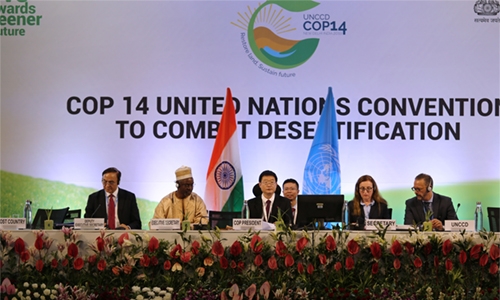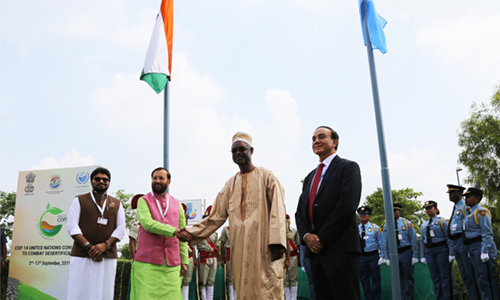COP14 : Drought is brought centre stage in New Delhi Declaration
Lack of policies to guide people on the best use of the land for a particular area is one of the major reasons behind desertification, says Ibrahim Thiaw, the Executive Secretary of United Nations to Combat Desertification (UNCCD), in a statement issued to media. Excerpts:
Why combating desertification is so important?
How does it affect people? Desertification is the loss of productivity of the land over the long term. The impacts on communities differ depending on how the degradation unfolds.
For instance, the ability of the land to produce a crop or hold water is compromised when land is degraded. For communities that depend on the land, it affects the amount of food they can produce or the fresh water from the ground. In the long run, when degradation happens at large scale, competition over the remaining productive land can intensify to the point of causing conflict. In some cases, desertification leads to more frequent and severe droughts happening, which can also force people to migrate.
What are some solutions at hand to combat desertification?
The solutions will depend on what is really driving the degradation. For instance, it could be lack of policies to guide people on the best use of the land for a particular area. It may also be the lack of resources for landusers to invest in good practices. Or it may be the use of poor pastoral practices such as overgrazing. There is no magic bullet or one-size-fits all.
To use an analogy, land degradation is like disease. Many diseases lead to the degradation of the land. To heal the land, you have to know what causes the disease.
This is why land degradation neutrality is about “doing the right thing, at the right place at the right scale”.
How do you view the COP 14 India conference?
I am overwhelmed by its scale. The facilities provided for the Conference are world class. But what is even more important is that it’s the largest COP we have ever had, with more than 7,500 badges issued by today. We will also have the highest representation at the government and United Nations levels in the 25-year history of the Convention. It shows the interest and determination of people in India to tackle the issue of desertification and land degradation.
What are your expectations from the conference?
I have very high expectations from this Conference. It is the first Conference I am organizing, but I am very encouraged by the willingness of the Parties to do three very important things that are necessary for the success of a Conference.
First, they are putting on their agenda very tough but urgent issues -- land tenure, drought, consumption and production flows, etc.
Second, they are looking ahead to the challenges they expect on this and related issues in the future in their efforts to find solutions. For example, the outcomes of this COP will also be relevant for the Climate Action Summit that will take place in New York later this month.
They will feed into the Climate Change Conference of the Parties in December, just before implementation of the Paris Agreement. They will also feed into the Post-2020 Biodiversity Framework being negotiated and into the global campaign of Ecosystem Restoration.
Lastly, from the conversations I have had with the Government of India and other countries, we can expect announcements about exiting, practical on-the-ground initiatives from this COP.
Related Posts


